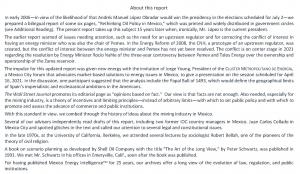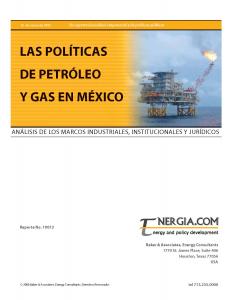New report by Houston oil market analyst reinterprets Mexico’s legal history & oil and gas potential: A counternarrative
As federal authorities are appropriating historical figures and events with new interpretations to fit an ideological template, a counternarrative is needed.
According to the new report (PPP 10077), the current impasse in energy policy in Mexico portends grave consequences for investors, the economy, and federal revenues.
In the current government’s telling of events, former President Lázaro Cárdenas (1934-40) stands out as a unique historical visionary, while former President Porfirio Díaz (1884-1911) and the neoliberal presidents (1982-2018) are collectively faulted for unpatriotic acquiescence to private interests.
In the retelling of events, this report turns much of this story upside down. Annually, on March 18th, the Oil Expropriation of 1938 is commemorated as the high mass of Mexico’s civil religion (See, Wikipedia, “Civil Religion”). For the development of Mexico’s oil industry, however, the events of 1958 were, by far, more important than those of 1938.
The PETROLEUM ACT OF 1958 reinterpreted constitutional Article 27 to mean that all industrial activities of the oil industry would be handled by Petróleos Mexicanos (Pemex). The sixth article forbade, in effect, any role for private oil companies in exploration and production: Pemex was specifically prohibited from granting any contract by which an oil company would be paid proportionately as a function of success. That law would isolate Pemex from the global oil industry for more than a half-century. Pemex could have no partners to share risks and leverage technology and skills. The damage from the law may be appreciated in the singular detail that despite 30 years of effort, not a single barrel of oil has been produced from a deepwater reservoir.
Since Cárdenas’s time, an eponymous civil religion (Cardenismo) has dominated political discourse and economic policy. The central tenet is the belief that ownership confers economic value, which is increased in proportion to the State’s control, as an economic actor and as a regulator, of hiring, infrastructure, and markets.
Outside of Mexico, however, in open-market economies, there is little support for this doctrine. In Mexico, all parties recognize the need for new models of public oversight and commerce, but there is no convergence. In this report, we suggest strategies for a better energy future, but for that, Mexico’s oil and gas history must be better understood, especially the significance of the Oil Law of 1958, the aura of which the current government finds so compelling.
---
Un nuevo informe de un boletín sobre el mercado petrolero de Houston interpreta la historia legal de México.
Un informe de Mexico Energy Intelligence™, un boletín de energía con sede en Houston, establece una contranarrativa de los acontecimientos importantes en la historia petrolera de México.
De acuerdo con el nuevo informe (PPP 10077), el actual estancamiento de la política energética en México augura graves consecuencias para los inversionistas, la economía y los ingresos federales.
Al hablar de los acontecimientos de las autoridades federales, el expresidente Lázaro Cárdenas (1934-40) se destaca como un visionario histórico único, mientras que el expresidente Porfirio Díaz (1884-1911) y los presidentes neoliberales (1982-2018) son culpados colectivamente por la aquiescencia antipatriótica a los intereses privados.
En la narración de los acontecimientos, este informe pone gran parte de esta historia patas arriba.
Anualmente, el 18 de marzo, la Expropiación petrolera de 1938 se conmemora como la alta masa de la religión civil de México (Ver, es.Wikipedia.org, "Religión Civil"). Para el desarrollo de la industria petrolera de México, sin embargo, los acontecimientos de 1958 fueron más importantes que los de 1938.
La Ley petrolera de 1958 reinterpretó el artículo 27 constitucional para significar que todas las actividades industriales de la industria petrolera serían manejadas por Petróleos Mexicanos (Pemex).
El sexto artículo prohibía, en efecto, cualquier papel de las petroleras privadas en la exploración y producción: Pemex tenía específicamente prohibido otorgar cualquier contrato por el cual una petrolera sería pagada proporcionalmente en función del éxito. Esa ley aislaría a Pemex de la industria petrolera mundial durante más de medio siglo. Pemex no podría tener socios para compartir riesgos y apalancar tecnología y habilidades.
Los daños de la ley pueden apreciarse con el singular detalle de que, a pesar de 30 años de esfuerzo, ni un solo barril de petróleo se ha producido a partir de un depósito de aguas profundas. Desde la época de Cárdenas, una religión civil epónima (cardenismo) ha dominado el discurso político y la política económica. El principio central es la creencia de que la propiedad confiere valor económico, que se incrementa en proporción al control del Estado, como actor económico y como regulador, de contratación, infraestructura y mercados.
Fuera de México, sin embargo, en las economías de mercado abierto, hay poco apoyo a esta doctrina. En México, todas las partes reconocen la necesidad de nuevos modelos de gestión pública y comercio, pero no hay convergencia. En este informe, se recomiendan estrategias para un futuro energético mejor, pero para ello, la historia del petróleo y el gas de México debe entenderse mejor, especialmente la importancia de la Ley petrolera de 1958, el aura de la cual que el gobierno actual considera tan convincente.
George Baker
Mexico Energy Intelligence
+1 832-434-3928
email us here
Visit us on social media:
Twitter
LinkedIn
Presentation in Spanish by George Baker about the legal history of Mexico's oil industry
Legal Disclaimer:
EIN Presswire provides this news content "as is" without warranty of any kind. We do not accept any responsibility or liability for the accuracy, content, images, videos, licenses, completeness, legality, or reliability of the information contained in this article. If you have any complaints or copyright issues related to this article, kindly contact the author above.



